Hindmarsh, South Australia
Hindmarsh is an inner suburb of Adelaide, South Australia. It is located in the City of Charles Sturt.
| Hindmarsh Adelaide, South Australia | |||||||||||||||
|---|---|---|---|---|---|---|---|---|---|---|---|---|---|---|---|
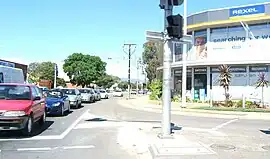 Manton Street, Hindmarsh | |||||||||||||||
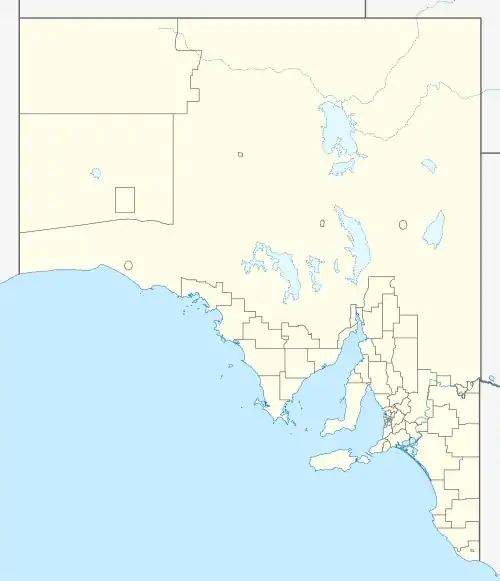 Hindmarsh | |||||||||||||||
| Coordinates | 34°54′25″S 138°34′12″E | ||||||||||||||
| Population | 232 (SAL 2021)[1] | ||||||||||||||
| Established | c. 1838[2] | ||||||||||||||
| Postcode(s) | 5007[3] | ||||||||||||||
| Area | 0.88 km2 (0.3 sq mi)[4] | ||||||||||||||
| Location | 3.5 km (2 mi) NW of Adelaide city centre[3] | ||||||||||||||
| LGA(s) | City of Charles Sturt[5] | ||||||||||||||
| State electorate(s) | West Torrens | ||||||||||||||
| Federal division(s) | Adelaide (2011)[6] | ||||||||||||||
| |||||||||||||||
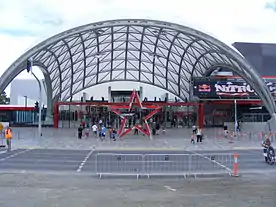
The suburb is located between South Road to the west and North Adelaide. The River Torrens forms its southern boundary and the Grange and Outer Harbour railway line forms the northeast.[7]
History
Before the colonisation of South Australia in 1836, the land now called Hindmarsh was occupied by the Kaurna people.[8]
The suburb was named by South Australia's first Governor, Sir John Hindmarsh. Hindmarsh was the first owner of section 353 in the Hundred of Yatala, being among the earliest to make a selection of a "country section" to which he and other early investors in South Australia were entitled by their purchase of land orders prior to settlement (see Lands administrative divisions of South Australia § Land division history). He and Arthur Lindsay subdivided the land in June 1838 and were responsible for it being laid out as the first private town in the colony of South Australia.[4] In the process, according to South Australian historian Geoffrey Manning, the Governor "acquired a dubious reputation by prohibiting squatting in the Parklands, thus forcing people to acquire land in the subdivision".[2]
In 1916, the old town hall was expanded and extensively refurbished by noted cinema architect Chris A. Smith, to accommodated use as a picture theatre. This was the Star Theatre, one of cinema chain owner Dan Clifford's earliest cinemas.[9][10] Later known as the Odeon Star, Cinema Italia, Cinema Europa, and Windsor Theatre, the cinema eventually closed in 1990.[11]
The modern suburb of Hindmarsh has western and southern boundaries contiguous with the original village and section 353, the Torrens River being the southern boundary. The modern suburb includes land between Port Road and the railway line as well, making the railway line the northern border instead of Port Road, as it was for the early village.
Demographics
The 2016 Census by the Australian Bureau of Statistics counted 231 persons in Hindmarsh on census night. Of these, 61.1% were male and 38.9% were female.[12]
The majority of residents (66.8%) are of Australian birth, with other common census responses being England (5.2%), South Korea (4.3%), Malaysia (3.8%), Thailand (3.3%), and Italy (1.9%).[12] Additionally, people of Aboriginal and/or Torres Strait Islander descent made up 2.6% of the suburb.[12]
In terms of religious affiliation, 46.8% of residents attributed themselves to being irreligious, 17.9% attributed themselves to being Catholic, 6.8% attributed themselves to be Buddhist, and 6.4% attributed themselves to being Eastern Orthodox.[12] Within Welland, 82.8% of the residents were employed, with the remaining 17.2% being unemployed.[12]
Politics
Local government
Hindmarsh is part of Beverley Ward in the City of Charles Sturt local government area, being represented in that council by Independent Edgar Agius and Labor Member Matt Mitchell.[13]
State and federal
Hindmarsh lies in the state electoral district of West Torrens. Prior to the 2016 redistribution it was in the Croydon district.[14] and the federal electoral division of Adelaide.[6] The suburb is represented in the South Australian House of Assembly by Tom Koutsantonis[14] and federally by Steve Georganas.[6]
Community
The local newspaper is (was?) the Weekly Times Messenger. Other regional and national newspapers such as The Advertiser and The Australian are also available.[15]
Facilities and attractions
The Gov
The Governor Hindmarsh Hotel, more commonly known as The Gov on Port Road, Hindmarsh, was opened in 1848. It underwent renovations in 1988,[16] but had fallen into disrepair when new owners the Tonkins took over in 1993. "The Gov" was developed into a major and popular live music venue, with five separate performing spaces and featuring a wide range of genres of music. It has attracted performers such as Billy Bragg, Vika and Linda Bull, Paul Kelly and The Whitlams, as well as lesser-known musicians, local schools' annual concerts[17] and weekly open mic sessions in the front bar.[18] The venue has won a number of awards, such as both the AHA(SA) and National AHA awards for Best Live Music Venue in 2017.[19][20] It has been described as "the city's mecca for live music".[21] Its performance spaces are also used by the Adelaide Fringe each year.[22]
Adelaide Entertainment Centre
The Adelaide Entertainment Centre is a major venue for all kinds of performances, from small intimate spaces to large concerts. It houses up to 11,300 people.
Other venues
- The 16,500-seat Hindmarsh Stadium, home to the Adelaide United football club
- Holden Street Theatres, a performing arts precinct
- The Education Development Centre, a conference venue owned by the state Department for Education[23]
- Seven Network's Adelaide studio
- The Hindmarsh Library, a public library servicing the area.
Shopping and dining
There are many cafes and restaurants along Port Road and elsewhere in the suburb, as well as the Gaganis Bros wholesaler.
Heritage listings
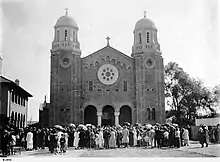
- Hindmarsh Town Hall (1936), designed by Christopher Arthur Smith.[24] listed on the South Australian Heritage Register 23 November 1989.[25]
- Sacred Heart Church, Port Road, was designed in Romanesque Revival style by Adelaide architect Herbert Jory of Woods, Bagot, Jory & Laybourne Smith[26] and opened in November 1924 as St Saviour's Church.[27][28] The church was renamed and dedicated as Sacred Heart Church in 1950. It is a Missionaries of the Sacred Heart (MSC) church.[29][30] The church and its priory were locally heritage-listed by the council on 12 September 2017.[31][32]
Transport
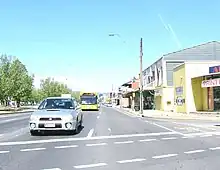

Port Road is the main arterial road connecting the suburb to the Adelaide city centre, while South Road forms its western boundary.[7]
Hindmarsh is serviced by public transport run by the Adelaide Metro:[33]
- The Grange and Outer Harbour railway line passes beside the suburb.[33] The closest station is Bowden.[7]
- Adelaide Metro operates a tram service to the Entertainment Centre, which is free from anywhere in the city centre.[33]
- The suburb is serviced by several bus routes.[33]
See also
References
- Australian Bureau of Statistics (28 June 2022). "Hindmarsh (SA) (Suburb and Locality)". Australian Census 2021 QuickStats. Retrieved 28 June 2022.
- "Place Names of South Australia". The Manning Index of South Australian History. State Library of South Australia. Retrieved 1 February 2012.
- "Hindmarsh, South Australia (Adelaide)". Postcodes-Australia. Postcodes-Australia.com. Retrieved 1 February 2012.
- "Placename Details: Hindmarsh". Property Location Browser. Government of South Australia. 17 August 2010. SA0030651. Retrieved 11 December 2017.
Derivation of Name: Governor John Hindmarsh; Other Details: The first private town laid out in the colony. Originally a private subdivision of section 353. Governor Hindmarsh owned the land prior to the subdivision into allotments by Messers Hindmarsh and Lindsay in June 1838. Portions of the suburbs of Bowden, Brompton & Ridleyton added the suburb of Hindmarsh. The area of land where the suburb is located was recorded by Teichelmann & Schürmann as Karraudo-ngga and by William Williams as Kurrayundonga.
- "City of Charles Sturt Wards and Council Members" (PDF). City of Charles Sturt. Archived from the original (PDF) on 5 August 2011. Retrieved 1 February 2012.
- "Find my electorate: Adelaide". Australian Electoral Commission. Archived from the original on 11 March 2012. Retrieved 1 February 2012.
- Adelaide and surrounds street directory (49th ed.). UBD. 2011. ISBN 978-0-7319-2652-7.
- Horton, David R. (1996). "Map of Indigenous Australia". AIATSIS. Retrieved 18 December 2022.
- "Dan Clifford, starting as newsboy/bookmaker, builds his classy Star circuit of Adelaide film theatres from 1917". AdelaideAZ. Retrieved 5 December 2022.
- "Dan Clifford". Awesome Adelaide. 11 September 2022. Retrieved 11 December 2022.
- Hennessy, Antoinette (2016). Entertaining the Classes: An archaeological investigation of historic cinemas in Metropolitan Adelaide, South Australia, and their development in relation to social class, 1896-1949 (MA). Flinders University. p. 97. Retrieved 18 December 2022.PDF
- City of Charles Sturt > Councillor contacts Retrieved 19 September 2022.
- "Electoral Districts – Electoral District for the 2010 Election". Electoral Commission SA. Archived from the original on 22 August 2011. Retrieved 1 February 2012.
- "South Australian Newspapers". Newspapers.com.au. Australia G'day. Archived from the original on 29 April 2011. Retrieved 1 February 2012.
- "Governor Hindmarsh Hotel in Bowden with Manager Martin Abbott celebrating the finish of renovations. 1988. B70869/1345" (Photograph). State Library of South Australia. Retrieved 23 August 2019.
- Sly, David (14 June 2018). "After 25 years, the song remains the same at The Gov". The Adelaide Review. Retrieved 23 August 2019.
{{cite journal}}: Cite journal requires|journal=(help) - "Front Bar Gig Guide". The Gov. Retrieved 23 August 2019.
- "History". The Gov. Retrieved 23 August 2019.
- "Governor Hindmarsh Hotel in Hindmarsh (Adelaide)". Gday Pubs. Retrieved 23 August 2019.
- Sutton, Malcolm (4 March 2015). "Cold Chisel a reminder of SA's music scene before pokies and inner-city apartments 'decentralised' it". Australia: ABC News. Retrieved 23 August 2019.
- "It's Fringe Parties Galore at the Gov". scenestr. 11 February 2019. Retrieved 23 August 2019.
- "Education Development Centre (EDC)". Government of South Australia. Dept for Education. Retrieved 23 August 2019.
- "Architect Details: Christopher (Chris) Arthur". Architects of South Australia. University of South Australia. Retrieved 27 July 2020.
- "2 Milner Street, Hindmarsh (Hindmarsh Town Hall (including Town Hall Building, Assembly Hall, Library and Facade of Skating Rink)". SA Heritage Places Database Search. Retrieved 29 July 2020.
- "Building Details: Sacred Heart Catholic Church". Architects of South Australia. University of South Australia. Retrieved 21 January 2021.
- "Roman Catholic Church, Hindmarsh". State Library of South Australia. 15 November 1924. Retrieved 21 January 2021.
- "St.Saviour's Church Hindmarsh: Forty hours' adoration". The Southern Cross. Vol. XXXIX, no. 2030. South Australia. 16 November 1928. p. 7. Retrieved 21 January 2021 – via National Library of Australia.
- Malone, Peter (29 July 2019). "Hindmarsh, new book by Jim Littleton MSC". Missionaries of the Sacred Heart. Retrieved 21 January 2021.
- "Sacred Heart Catholic Church, Hindmarsh" (Photo). State Library of South Australia. Retrieved 19 January 2021.
- "Heritage Place Details: 252-258 Port Road Hindmarsh (Sacred Heart Church)". The South Australia Heritage Places database. Retrieved 21 January 2021.
Whole of church under main gable, cupola belltowers, including side chapels / porches and rear sacristy. Includes open space forward of church.
- "Heritage Place Details: 252-258 Port Road Hindmarsh (Sacred Heart Church Priory)". The South Australia Heritage Places database. Retrieved 21 January 2021.
Whole of two-storey building under terracotta tile hipped roof, including open arched colonnades around building.
- "Bus, tram and train timetables". Adelaide Metro. Dept. for Transport, Energy and Infrastructure, Public Transport Division. Retrieved 24 August 2019.
External links
- "City of Charles Sturt". Official website. City of Charles Sturt. Retrieved 1 February 2012.
- Susan Marsden. "Hindmarsh-a short history". website. Professional Historians Association (South Australia). Retrieved 30 March 2012.